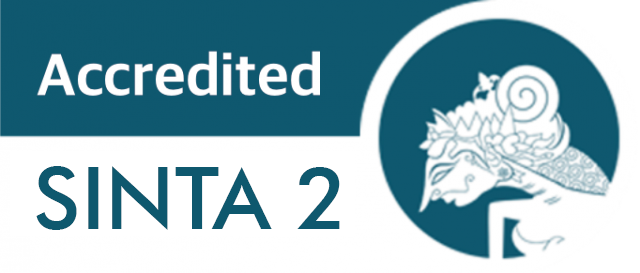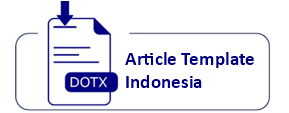IMPLEMENTASI ALGORITMA MACHINE LEARNING UNTUK DETEKSI PERFORMA AKADEMIK MAHASISWA
Abstrak
Performa akademik mahasiswa adalah indikator kunci keberhasilan pengelolaan program studi. Deteksi performa akademik dapat membantu pengelola program studi memonitor dan mengambil tindakan proaktif terhadap mahasiswa yang berpotensi mengalami kesulitan. Machine learning dapat menjadi solusi untuk mengatasi tantangan ini dengan membantu dalam klasifikasi dan deteksi kemampuan akademik mahasiswa. Teknik machine learning telah terbukti sangat efektif dalam menganalisis data yang kompleks dan mengungkap pola-pola tersembunyi yang sulit dideteksi oleh manusia. Penelitian ini bertujuan untuk mengeksplorasi implementasi algoritma machine learning dalam mendeteksi performa akademik mahasiswa, khususnya pada Program Studi Pendidikan Matematika Universitas Nias. Dengan kemajuan teknologi, machine learning telah terbukti efektif dalam mengklasifikasi data dan mendeteksi pola tersembunyi yang tidak dapat diidentifikasi oleh metode tradisional. Penelitian ini menggunakan algoritma Support Vector Machine (SVM) untuk memprediksi performa akademik mahasiswa berdasarkan dataset yang dikumpulkan dari data primer mahasiswa. Dataset ini mencakup berbagai faktor seperti nilai IPK, kehadiran, partisipasi, serta penggunaan sumber daya belajar. Hasil analisis menunjukkan bahwa model SVM yang digunakan memiliki akurasi sebesar 77,59%, dengan bias yang lebih condong pada kelas mahasiswa dengan performa akademik baik. Hasil penelitian ini diharapkan dapat memberikan kontribusi praktis dalam pengembangan metode pembelajaran yang lebih efektif dan personalisasi intervensi akademik di perguruan tinggi.
Referensi
[1] Al Husaini, Y., Syufiza, N., Shukor, A., Said, Y. N., & Husaini, A. (2022). Factors Affecting Students’ Academic Performance: A review. Social Science Journal, 12(3), 6. https://www.researchgate.net/publication/367360842
[2] Almita, Tahir, M., & Hajjad, M. N. (2023). Employee Performance and the Impact of Workplace Facilities and Discipline. Jurnal Manajemen Bisnis, 10(2), 417–425.
[3] Aspiah, R., & Taghfirul Azhima Yoga Siswa. (2022). Implementasi Correlation Based Feature Selection (Cfs) Untuk Peningkatan Akurasi Algoritma C4.5 Dalam Prediksi Performa Akademik Mahasiswa Berbasis Learning Management System. Jurnal Ilmiah Betrik, 13(2), 199–207. https://doi.org/10.36050/betrik.v13i2.523
[4] Banerjee, A., Chen, S., Fatemifar, G., Zeina, M., Lumbers, R. T., Mielke, J., Gill, S., Kotecha, D., Freitag, D. F., Denaxas, S., & Hemingway, H. (2021). Machine learning for subtype definition and risk prediction in heart failure, acute coronary syndromes and atrial fibrillation: systematic review of validity and clinical utility. BMC Medicine, 19(1), 1–14. https://doi.org/10.1186/s12916-021-01940-7
[5] Fatimah, S., Manuardi, A. R., & Meilani, R. (2021). Tingkat Efikasi Diri Performa Akademik Mahasiswa Ditinjau Dari Perspektif Dimensi Bandura. Prophetic : Professional, Empathy, Islamic Counseling Journal, 4(1), 25. https://doi.org/10.24235/prophetic.v4i1.8753
[6] Firman Akbar, & Rahmaddeni. (2022). Komparasi Algoritma Machine Learning Untuk Memprediksi Penyakit Alzheimer. Jurnal Komputer Terapan, 8(2), 236–245. https://doi.org/10.35143/jkt.v8i2.5713
[7] Li, J., Xue, E., Li, C., & He, Y. (2023). Investigating Latent Interactions between Students’ Affective Cognition and Learning Performance: Meta-Analysis of Affective and Cognitive Factors. Behavioral Sciences, 13(7). https://doi.org/10.3390/bs13070555
[8] Munjirin, A., & Iswinarti. (2023). Faktor-Faktor yang Mempengaruhi Prestasi Akademik Remaja. Cognicia, 11(2), 106–111. https://doi.org/10.22219/cognicia.v11i2.29010
[9] Suriani, U. (2023). Penerapan Data Mining untuk Memprediksi Tingkat Kelulusan Mahasiswa Menggunakan Algoritma Decision Tree C4.5. Journalcisa, 3(2), 55–66. http://jesik.web.id/index.php/jesik/article/view/91
[10] Vera Wati, Yuliana, Nisrina Yulia Setyowati, & Mudawil Qulub. (2023). Deteksi Wajah Menggunakan Algoritma Viola Jones Berbasis Android. TEKNIMEDIA: Teknologi Informasi Dan Multimedia, 4(1), 30–37. https://doi.org/10.46764/teknimedia.v4i1.92
##submission.copyrightStatement##
##submission.license.cc.by-sa4.footer##Semua tulisan pada jurnal ini menjadi tanggungjawab penuh penulis. Jurnal Teknimedia memberikan akses terbuka terhadap siapapun agar informasi dan temuan pada artikel tersebut bermanfaat bagi semua orang. Jurnal Teknimedia dapat diakses dan diunduh secara gratis, tanpa dipungut biaya, sesuai dengan lisensi creative commons yang digunakan.

Jurnal TEKNIMEDIA : Teknologi Informasi dan Multimedia is licensed under a Lisensi Creative Commons Atribusi-BerbagiSerupa 4.0 Internasional


.png)






